Sensing a New Spirit
Two-Spirit people are embracing their gay identity as they openly make their way in business
By Rick Garrick
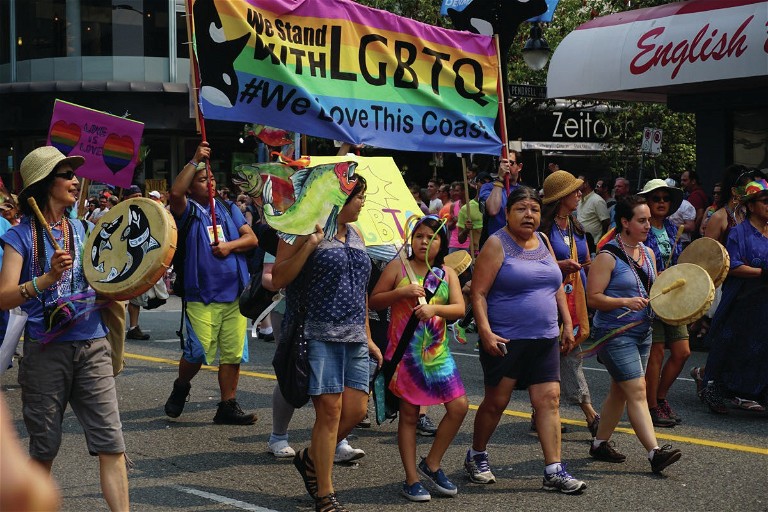
First Nations group supporting equal rights in the Vancouver Pride Parade
As more Indigenous people make their mark in business in Canada, their Two-Spirit members are changing perspectives and paving the way for a more tolerant business culture.
Being openly Two-Spirit and operating a business is much easier today than was in the past, at least for some. Nadine Arpin is the co-owner of D J’s Gas Bar, a small second-generation business in Sioux Lookout started by her parents. She identifies as a Two-Spirit Red River Michif and says her experience as an adult is quite a contrast to 30 years ago, when she would work at her parent’s filling station as a teen.
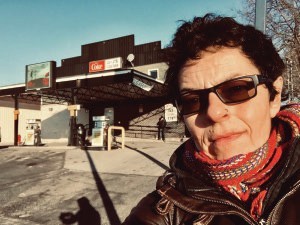
“ I like to think that perhaps Sioux Lookout has become a little less homophobic because I have chosen to live my life here ”
-NADINE ARPIN
“The town has changed since [then] but growing up I was exposed to homophobia because I was in the public eye,” Arpin says. “Being in the fuel service/retail family business, I was front and centre, dealing with the public on a daily basis. Frankly people could be aggressive and abusive, feeling like they had the right to make comments about my lifestyle. So that was a challenge.”
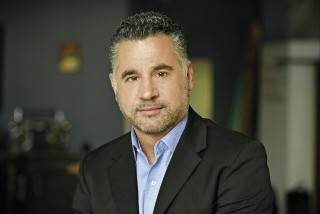
“ I’m constantly bringing light to the table in terms of people understanding someone who is gay and getting to know someone who is [Anishinabe] ”
-ROBERT TURGEON
Arpin, who also works as a filmmaker, says she feels much more comfortable as a Two-Spirit person in the arts world because it embraces diversity. When teaching Indigenous students about filmmaking during a series of filmmaking mentoring workshops in a First Nation community, she found young people receptive and curious about LGBTQ+ topics.
“The very first group I worked with chose a homosexual storyline,” Arpin says. “I was completely surprised and delighted that the school was so open and supportive. At the end, the film was screened for the entire school.”
Today, Arpin feels she is viewed as a respected business owner in her community, and she hopes that by running her business as an openly gay person she has helped change people’s attitudes toward homosexuality in her small, northern Ontario town.
“I’ve come to embrace Sioux Lookout as a result of my business [and] I like to think that perhaps Sioux Lookout has become a little less homophobic because I have chosen to live my life here,” Arpin says, reflecting with fondness that she grew up at D J’s Gas Bar and feels an integral part of the community.
TRUE SELF Robert Turgeon is the managing broker for a real estate company with offices in Toronto, Muskoka and Collingwood. He identifies as gay and Matachewan but is quick to point out that neither his sexual orientation nor his Indigenous background have impacted his career. In his line of work, he says, people focus on his professionalism and expertise, not his background.
“People don’t hire me because I’m gay and they don’t hire me because I’m [Anishinabe]; they hire me for the great work I do,” Turgeon says. “What I bring to the table in terms of skillset, my professionalism, my personality and what I stand for has a lot to do with my success. I’m at a place in my career path where I have recruiters reaching out to me on a regular basis. This is a new thing in the last few years, but I attribute that to my professional resume and experience.”
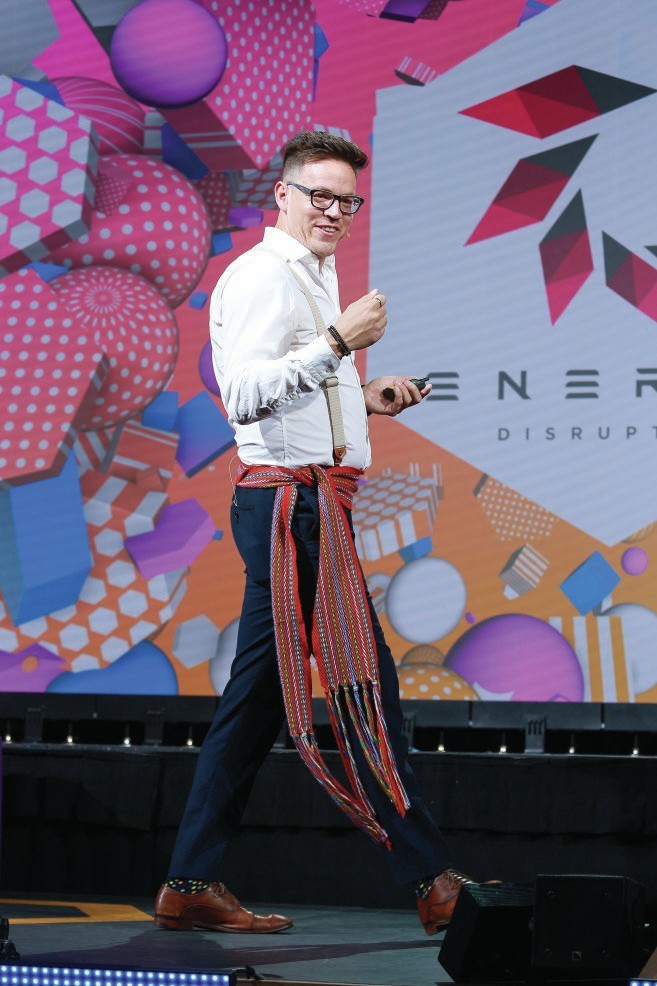
“ I was able to highlight Indigenous ingenuity, leadership and industry par ticipation in energy through my connections within the community ”
GREGORY JOHN
Turgeon, who has worked in real estate for 17 years, says he has always openly identified as First Nations and as a proud member of the gay community. “I’m proud of being [Anishinabe]. It’s a big part of who I am and where I come from, after all. My great-grandfather was the first recognized Chief of Matachewan,” Turgeon says.
“I’m also proud of being a successful gay man in both my career and personal life,” he adds. “I feel that I’m constantly bringing light to the table in terms of people understanding someone who is gay and getting to know someone who is [Anishinabe]. I can’t say that those individual things have been the reason for having success, but they are certainly a big part of who I am.”
Ultimately, Turgeon feels it all comes down to being true to yourself, both in your personal life as well as your professional one. “I’m very comfortable and confident in being myself. Even when I’m coaching new realtors new to the field, I always tell them, ‘Just be who you are, people will be attracted to you because you are just being you, genuine and true to yourself,’” he says.
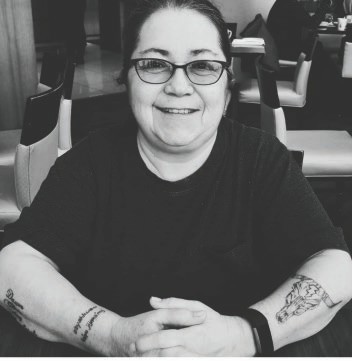
Elder Laureen Blu Waters
DECOLONIZING MINDS
Elder Laureen Blu Waters is a traditional knowledge advisor who works with businesses to advise them on topics tied to diversity. As both an Indigenous and Two-Spirit woman, Blu Waters brings a unique perspective to her work.
“I’m involved in many different aspects with different organizations and different businesses to help decolonize their minds and to open up to different perspectives that exist,” she says. “To treat each other equally as a human being involves decolonizing your understanding that gender diversity does not exist.”
Blu Waters says businesses are seeing that they need a variety of perspectives. She reflects on her recent work with Starbucks to make their business more harmonious for staff and customers.
“Being able to share about gender diversity with Starbucks and being part of their celebrations… to embrace diversity really [opened] up the door for them to create more business,” Blu Waters says.
ODD ONE OUT
Jarret Leaman, co-founder of Akawe Technologies and the Centre for Indigenous Innovation and Technology, identifies as a Two-Spirit Magnetawan citizen. He says that as a young, queer Indigenous man he was often the odd one out and found it hard to gain legitimacy in the business community in the early half of his career.
“I was in positions where I was speaking to boards [and] I was the only one that was that age and I was the only one that was Two-Spirit and I was the only one that was Native,” Leaman says.
It helped that he had a thick skin. Leaman had learned to deal with criticism while competing as a gymnast in university and working in theatre as a young man. He realized that hard work gained you respect and helped people look beyond their own preconceptions.
“The harder you work and the more that you produce results, the harder it is for people to question your abilities. So for me, it’s always been about working very hard, very diligently and very ethically,” Leaman says.
CHANGING POINT
Gregory John, a Métis, is the leading executive officer and EVP of business development at Unimaize Technologies Inc. and president of Four Peaks Business Development, a company that creates opportunities for Indigenous people in the energy sector. An openly gay man, John has actively supported LGBTQ+ initiatives in his home province of Alberta. He points ro his receiving the 2018 Calgary Stampede Western Trailblazer Award for his efforts to support Gay-Straight Alliances in rural Alberta as a “pivotable changing point” in both his career and personal life.
“That kind of recognition started building a reputation around the work I do, and I was headhunted for several positions that had me transition back into the energy sector,” John says. “I was able to highlight Indigenous ingenuity, leadership and industry participation in energy through my connections within the community.”
That recognition, John says, stemmed from his efforts to support a group of LGBTQ+ students to organize the first rural Gay-Straight Alliance Summit in Alberta to discuss gay-straight alliances and diversity in 2018. “I helped start a Gay-Straight Alliance at my school where I grew up in Strathmore,” he says. “We had (about) 26 different schools from across rural Alberta travel up to 10 hours to get to Strathmore to connect with each other.”
While these were all positive developments that reflected openness and acceptance, things were not always so rosy. Like other Two-Spirit Indigenous youth, John says that he too had experienced the double-hit of homophobia and racism earlier in his career. “Experiencing that was pretty destructive to one’s self confidence,” he admits.
However on an endnote John stresses that the business scene in Alberta has certainly evolved to a better place when it comes to diversity and equity, pointing to his own success in the province’s energy sector as an example. “Calgary has grown up considerably since then,” he says, “which is now allowing me to work in this industry again authentically.” ■